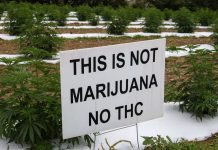Republished with permission from Weed News; Read the original article HERE.
Hemp was once a very big part of America’s agricultural industry. Unfortunately that all changed with prohibition being enacted in the 1930s. For a brief time exceptions were made during World War 2, but for the most part hemp cultivation was completely prohibited in the United States for several decades. That all changed in 2014 when a provision of federal farming legislation allowed exceptions for hemp farmers in certain states. Hemp cultivation in America has been increasing ever since, with this year’s American hemp harvest being the biggest in a long, long time. Below is a press release issued by Vote Hemp which details the new era of hemp cultivation in America, along with some statistics from this year’s hemp season:
Vote Hemp, the nation’s leading grassroots hemp advocacy organization working to change state and federal laws to allow commercial hemp farming, has released its 2017 U.S. Hemp Crop Report. The report documents state-by-state progress of hemp legislation passed in 2017, reported acreage of hemp grown, identifies states with active hemp pilot farming programs and advocacy work the organization has lead over the past year. To view the complete Vote Hemp 2017 States Report, please visit: VoteHemp.com/cropreport
“We’ve seen hemp cultivation significantly expand in the U.S. in 2017, with over double the number of acres planted in hemp compared to last year and the addition of 4 more states with hemp pilot programs,” said Eric Steenstra, President of Vote Hemp. “The majority of states have implemented hemp farming laws, in clear support of this crop and its role in diversifying and making more sustainable our agricultural economy. It’s imperative that we pass the Industrial Hemp Farming Act in Congress, so that we can grant farmers full federally legal rights to commercially cultivate hemp to supply the growing global market for hemp products.”
Since the passage of Section 7606 of the Farm Bill, “Legitimacy of Industrial Hemp Research,” hemp cultivation in the U.S. has grown rapidly. The number of acres of hemp grown across 19 states totaled 23,343 in 2017, more than double the number of acres from the previous year. State licenses to cultivate hemp were issued to 1,424 farmers; and 32 universities conducted research on the crop. Despite this progress, hemp farmers face logistical and legislative hurdles that yet hinder the full scale commercial cultivation of hemp to supply American consumers: farmers rely on imported certified hemp seed from countries such as Canada and Italy; the DEA has obstructed interstate commerce of U.S. grown and manufactured hempseed oil and protein powder. And though H.R. 3530 The Industrial Hemp Farming Act has been introduced in Congress, farming of the crop remains prohibited at the federal level.
Among the fastest-growing categories in the natural foods industry, hemp seed is a rich source of Omega-3 and Omega-6 essential fatty acids (EFAs), providing both SDA and GLA, highly-digestible protein, and naturally-occurring vitamins and minerals, such as vitamin E and iron. An excellent source of dietary fiber, hemp seed is also a complete protein—meaning it contains all ten essential amino acids, with no enzyme inhibitors, making it more digestible by the human body. Advancements in hemp research and manufacturing demonstrate the remarkable versatility and product-potential for hemp. Hemp bast fiber has shown promising potential to replace graphene in supercapacitor batteries, which could then be used to power electric cars and handheld electric devices and tools. Hemp fiber can also be used to create environmentally friendly composites, and hard bio-plastics for use in everything from airplanes to car parts. Hemp houses are also on the rise, as hempcrete, which is energy-efficient, non-toxic, resistant to mold, insects and fire, has many advantages to synthetic building materials, lumber and concrete.
To date, thirty-three states have defined industrial hemp as distinct and removed barriers to its production. These states are able to take immediate advantage of the industrial hemp research and pilot program provision, Section 7606 of the Farm Bill: Alabama, Arkansas, California, Colorado, Connecticut, Delaware, Florida, Hawaii, Illinois, Indiana, Kentucky, Maine, Maryland, Michigan, Minnesota, Montana, Nebraska, Nevada, New Hampshire, New York, North Carolina, North Dakota, Oregon, Pennsylvania, Rhode Island, South Carolina, Tennessee, Utah, Vermont, Virginia, Washington, West Virginia and Wyoming.
Vote Hemp is a national, single-issue, non-profit organization dedicated to the acceptance of and a free market for low-THC industrial hemp and to changes in current law to allow U.S. farmers to once again grow the agricultural crop. More information about hemp legislation and the crop’s many uses may be found at www.VoteHemp.com. Video footage of hemp farming in other countries is available upon request by contacting Lauren Stansbury at 402-540-1208 or lauren@votehemp.com.







Comments are closed.